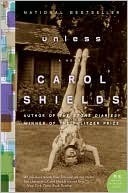What do you think?
Rate this book


255 pages, Kindle Edition
First published January 1, 2002


A life is full of isolated events, but these events, if they are to form a coherent narrative, require odd pieces of language, little chips of grammar (mostly adverbs or prepositions) that are hard to define, since they are abstractions of location or relative position, words like therefore, else, other, also, thereof, heretofore, instead, otherwise, despite, already, and not yet.
When she looks back on her life, when she’s a fifty-year-old Natalie, post-menopausal, savvy, sharp, a golf player, a maker of real estate deals, or eighty years old and rickety of bone, confined to a wheelchair – whatever she becomes she’ll never remember this exchange between the two of us outside the bathroom door… Her life is building upward and outward, and so is Chris’s. They don’t know it, but they’re in the midst of editing the childhood they want to remember and getting ready to live as we all have to live eventually, without our mothers. Three-quarters of their weight is memory at this point. I have no idea what they’ll discard or what they’ll decide to retain and embellish, and I have no certainty, either, of their ability to make sustaining choices.
"Norah seems lodged in childhood's last irresponsible days, stung by the tang of injustice, nineteen years old, with something violent and needful beating her brain. It's like a soft tumour, but exceptionally aggressive. Its tentacles have entered all the quadrants of her consciousness. This invasion happened fast, when no one was looking."A few years back, my loving aunt died of breast cancer so I wonder how a CA patient can still write a beautiful beautiful book while suffering from it.

Because Tom is a man, because I love him dearly, I haven't told him what I believe: that the world is split in two, between those who are handed power at birth, at gestation, encoded with a seemingly random chromosome determinate that says yes for ever and ever, and those like Norah, like Danielle Westerman, like my mother, like my mother-in-law, like me, like all of us who fall into the uncoded otherness in which the power to assert ourselves and claim our lies has been displaced by a compulsion to shut down our bodies and seal our mouths and be as nothing against the fireworks and streaking stars and blinding light of the Big Bang. That's the problem.
This cry is overstated; I'm an editor, after all, and recognize purple ink when I see it. The sentiment is excessive, blowsy, loose, womanish. But I am willing to blurt it all out, if only to myself. Blurting is a form of bravery. I'm just catching on to that fact. Arriving late, as always.